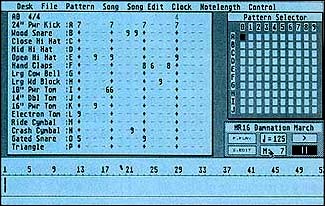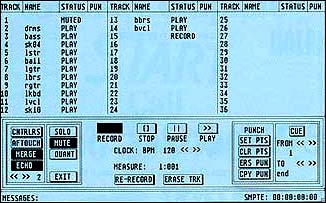The ST/MIDI
Connection
News, Views and
a Mini-Review
by Jim Pierson-Perry
START Contributing Editor
Another month, a whole new bushel of MIDI goodies, many from newcomers to the ST market. It's always good to welcome fresh talent; by the way, my current count puts the number of ST MIDI programs over the 200 mark! We'll also take a look at the Astra MIDI Box and how patch editor programs are branching out from synthesizers and now include effects devices.
 |
| Typical pattern edit screen from the MIDI Drummer program by MusicSoft. The setup shown was customized for an Alesis HR-16 drum machine. The different numbers in the pattern grid correspond to preset velocity values to add dynamics. |
New Players
Leading off is MusicSoft, with a collection of patch editor programs for the Alpha Juno, MT-32, D-10, ESQ-1, K1 and K4 operator DX synthesizers. MusicSoft also has the MIDI Drummer program, the first drum machine sequencer program for the ST.
A patch editor for the Yamaha TX81Z and DX11 marks the first release from Musicode. In addition to editing, the program contains an integrated sequencer to test patches in actual play. Sequences can be saved as standard MIDI files (Level 0).
Alfred Publishing has released two sets of music education programs for the ST. Practical Theory (three disks) and Music Achievement (six disks). Sandy Feldstein is the author of both packages, which are targeted at a high school/college entry-level audience, either for self-study or in a classroom setting. They come with an attractive, comprehensive set of textbooks and workbooks.
Finally, Johnsware has introduced the MIDI Boss, a MIDI system master control program. This can send program change commands, sysex data and other custom commands to any MIDI devices in your system with a single keystroke.
From Old Friends
Steinberg/Jones has released another patch editor in their Synthworks series. This one is for the Kawai K1 and compatibles. Sonus now offers several patch editors: ESQ-1/SQ-80 Design, D50 Design and MT-32 Design.
Savant Audio has released Edit-DSS, the first dedicated sample editor for the Korg DSS-1. Features include auditioning edits through the Atari monitor speaker, librarian functions and a patch generator
SynthView MI from Synergy Resources, is the first librarian for the new Korg M1 "do-everything" digital music workstation. An upgrade is planned for the near future to add editing capabilities along with the initial graphical librarian features.
 |
| Shot of the play screen for Dr. T's Keyboard Controlled Sequencer v1.6 running with the Phantom installed. Note the SMPTE time display in the lower right corner. |
That Synching Feeling
Those looking for a reliable way to tie their tape decks and MIDI sequencers together may want to check out the PPS-100 from J.L. Cooper. This is a rackmount hardware device for SMPTE to MIDI synchronization and also functions as a SMPTE event generator. It reads and writes all SMPTE formats, converts SMPTE to MIDI via Song Position Pointer messages and can optionally generate MIDI Time Code data.
The newest releases of Dr. T's KCS 1.6 and Level II sequencers have improved support for The Phantom, his SMPTE synchronization interface. Earlier versions could take over a minute to chase and lock to tape when using the sequencer at high clock resolutions (eg. 240 ppqn [pulses per quarter note]). The original version was fine for working at resolutions of up to 96 ppqn. The Phantom also provides a software controlled second MIDI Out port. MIDI channels can be assigned to either the ST or Phantom Out ports (or both). With the release of The Phantom, Dr. T's previous synch box, The Model S, has been discontinued.
On The Horizon
Here's some advance information to whet your appetite. All of these programs are expected to be released in early 1989 in time for the Winter NAMM meeting. TurboSynth, the new blockbuster sample creation/editing program from Digidesign, is being ported from the Mac to the ST.
Hybrid Arts is releasing Edit Track, basically SMPTE Track without the SMPTE features. This will give EA a professional-level sequencer for those not needing a dedicated tape synch device. All of their MIDI Track series programs are being upgraded to work with MIDI standard files, even those in MacBinary format.
Finally, look for Mark of the Unicorn and Opcode to enter the ST market. These companies are currently at the top of the Mac MIDI market and should provide excellent new products for the ST.
Affecting Effects
With MIDI firmly entrenched as the standard for controlling synthesizers and similar musical instruments, the next wave is to extend MIDI control into effects devices, those ubiquitous boxes that provide reverb, chorus, delay, distortion and all the other special effects to color and add character to the basic synthesizer sounds. Already, many such MIDI-equipped devices are available for hobbyist and professional applications.
The basic MIDI implementation is to use program change commands to flip from one preset to another. At more advanced levels, real-time MIDI control may be used to change the nature and intensity of the sound effect. Examples include varying the reverb decay rate or echo delay time. Typically, these devices are big on power and short on frontpanel programming controls and are ideal candidates for a patch editor-type computer program.
Several companies have begun releasing patch editor programs for the more popular effects devices. Dr. T distributes one for the Lexicon PCM-70 as part of the popular Caged Artist series. Their latest creation, due out around NAMM time, will handle four different multi-effects devices: the Lexicon LXP-1, Digitech DSP-128, Alesis Quadraverb and Yamaha SPX90. Johnsware offers fully GEM-compatible programs to control the DSP-128, Korg SDD-2000 digital delay and the Cooper MSB+ MIDI switchbay. The DSP-128 (a popular beast) is also covered by the DSP Enhancer from DataSound, which even provides a random patch generation function for effects.
Astra MIDI Box
The Astra MIDI Box is a solution to two problems facing the ST MIDI user: a need for multiple MIDI Out ports and the infamous Out/Thru port combination. The ST has a single MIDI Out port, which is fine for driving a single synthesizer, but if you want to use any more equipment, you must daisy-chain the components or use a Thru box. The daisy chain option works only if your equipment has sufficient MIDI Thru connections, which is not always the case (eg. Casio CZ-101 and most drum machines). A Thru box takes the original MIDI Out data and sends it to several connection ports (typically four or eight per box). Each device hooked to one of these ports sees its own copy of the original MIDI Out data.
More serious is that the ST MIDI Out port is hard-wired so that it also carries MIDI Thru data, thus violating the MIDI hardware protocol. As long as you use proper MIDI cables you'll have no problem; otherwise you stand an excellent chance of driving your synthesizers whacko.
Connecting the Astra MIDI Box to your ST provides one MIDI In, two MIDI Thru and three MIDI Out ports. The Thru and Out signals are decoupled from the ST output. The MIDI Box goes a step beyond a Thru box, however, by providing both multiple Out and Thru ports. If your system is large enough, you can hang a Thru box off each MIDI Box Out port and connect up to 24 synths or devices at once.
The MIDI Box is compatible with all ST MIDI software. Note that each Out port provides an identical signal. You cannot assign MIDI channels to flow to particular ports as with the proprietary software-controlled multiple Outs provided by The Phantom or Midiplexer interfaces. The MIDI Box comes in a sturdy ST-gray plastic box (about 6-by-5-by-3 inches). It is a passive device that just routes MIDI signals, and does not require a power supply. If you use more than a single MIDI instrument, the Astra MIDI Box may be just what you need to help put your system together.
PRODUCTS MENTIONED
Practical Theory Series. $125; Music Achievement Series, $199.95. Alfred Publishing Company, Inc., 16380 Roscoe Blvd., Van Nuys, CA 91410, (818) 891-5999
MIDI Box, $69.95. Astra Systems, Inc., 2500 South Fairview, Unit L, Santa Ana, CA 92704. (714) 549-2141.
DSP-128 Enhancer, $99.95. DataSound, 5056 Les Chateaux, Dallas, TX 75235, (214) 521-6723.
TurboSynth, no price set. Digidesign, 1360 Willow Run, Suite 101, Menlo Park, CA 94025, (415) 327-8811.
KCS ver. 1.6, $249; KCS Level II, $325; PCM-70 Editor $149; The Phantom, $249. Dr. T's Music Software, 2200 Boylston Street, Suite 306, Chestnut Hill, MA 02167, (617) 244-6954.
Edit Track Midiplexer, $299. Hybrid Arts, Inc., 11920 West Olympic Blvd., Los Angeles, CA 90064, (213) 826-3777.
PPS-100, $595. J.L. Cooper, 1931 Pontius Avenue, West Los Angeles, CA 90025, (213) 473-8771.
DSPatcher, $74.95; MIDI Boss, $74.95; MSBehave, $74.95; SDDemon, $74.95. Johnsware, 5802 42nd Avenue, Hyattsville, MID 20781, (301) 927-1947.
Mark Of The Unicorn, 222 Third Street, Cambridge, MA 02142, (617) 576-2760.
TX81ZIDX11 Voice Designer/Librarian, $99. Musicode, 5575 Baltimore Drive, Suite 105-127, La Mesa, CA 92042, (619) 469-7194.
Alpha Juno Editor/ Librarian, $99.95; D-10/110/20 Editor/ Librarian, $99.95; D-50 Editor/Librarian, $99.95; DX 4 Op Editor/ Librarian, $99.95; ESQ-1/SQ-80 Editor/Librarian, $99.95; K1 Editor/Librarian, $99.95; MIDI Drummer, $99.95; MT-32 Editor/Librarian, $99.95. Music Soft, 1560 Meadowbrook, Altadena, CA 91001. (818) 794-4098
Opcode, 1024 Hamilton Court, Menlo Park, CA 94025. (415) 321-8977.
Edit-DSS, $250. Savant Audio, 2140 Bellmore Avenue, Bellmore, NY 11710, (516) 826-6336.
D-50 Design, $149.95; ESQ-1 /SQ-80 Design, $149.95; MT-32 Design, $129.95. Sonus Corporation, 21430 Strathern Street, Suite H, Canoga Park, CA 91304, (818) 702-0992.
Synthworks K1, $199. Steinberg/J ones, 17700 RaymerStreet, Suite 1001, Northridge, CA 91325, (818) 993-4091.
SynthVlew M1, $79.95. Synergy Resources, 754 North Bolton Avenue, Indianapolis, IN 46219, (317) 356-6946.